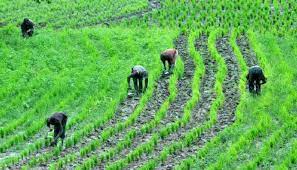Investment in Nigeria’s agricultural sector has witnessed a staggering 94% decline in the fourth quarter, reaching an alarming eight-year low. The downturn follows the declaration of a state of emergency in the agricultural sector by political figure Tinubu in June 2023 due to rising concerns about food insecurity. Despite the declaration, the sector has failed to witness significant growth, raising apprehensions about the nation’s food sustainability.

Edobong Akpabio, the executive director of Greenport Nigeria, shed light on the challenges hampering the sector’s progress. Akpabio emphasized that security issues in various states, coupled with the threat to life, have resulted in the loss of farmlands, leading to a substantial decrease in food production. The repercussions of this crisis are exacerbated by the high costs associated with food production, including expenses for land clearing, farm labor, seeds, fertilizers, herbicides, pesticides, irrigation, and logistics.
Akpabio highlighted the critical issue, stating, “When there is no farmer, there is no food.” The inability of many farmers to afford the escalating production costs has forced them to abandon their farms, contributing to a significant decline in food output.
The domino effect of this situation becomes even more pronounced as it impacts foreign investment in the agricultural sector. With a dwindling food supply and a struggling agricultural landscape, foreign investors are hesitant to inject capital into a sector plagued by challenges. The decline in foreign capital importation further exacerbates the strain on an already beleaguered agricultural industry.
Tinubu’s state of emergency declaration in June 2023 aimed to address the pressing issue of food insecurity. However, the lack of substantial growth in the sector and the sharp decline in agricultural investment paint a grim picture for Nigeria’s ability to achieve food sustainability and attract the necessary investment to revitalize the agricultural landscape.
As the nation grapples with these challenges, there is a growing call for comprehensive measures to address security concerns, alleviate production costs, and create an environment conducive to sustainable agriculture. The fate of Nigeria’s agricultural sector hangs in the balance, with stakeholders urging prompt action to avert a deepening crisis.














